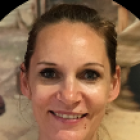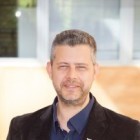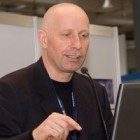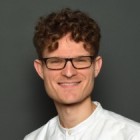Conference Agenda OEB 2017
FD2 Full-day Event
Date Wednesday, 6 Dec Time – Room: Bellevue Price: free of charge Status: places available
Speexx Exchange Reality Check

Laura Overton
Managing Director, Towards Maturity, UK
Laura is the Managing Director of Towards Maturity a not-for-profit benchmark practice that provides independent expert research and advice in using learning innovation to accelerate business performance. Her work is based on 25+ years of practical experience looking at learning innovation for business advantage, backed by her independent research with over 5,500 organisations and 25,000 learners since 2003. She is author of Author of over 40 major research reports including ´Live Online Learning´, ´Bridging the Gap – Integrating learning and work´ and over 200 articles.
Links

Thomas Jenewein
Business Development Manager, SAP Education, Germany
Thomas Jenewein is the SAP Education Business Development Manager for Middle & Eastern Europe. After studying Organizational Psychology he collected more than 20 years of experience from different positions in the field of Learning & Talent Management, consultancy and program management. Thomas is a frequent content contributor and creates blog entries, articles or holds presentations on innovation in learning.
Links

Jamie Turner
Human Resource Director for Europe, SDI Media, Germany
SDI is a media localization provider, offering dubbing, subtitling and media services. Jamie is a senior HR leadership professional with extensive experience in the Automotive, Oil & Gas and Media industries. She has coordinated global HR Learning department centralizations and installations of learning & performance management systems. Her diverse experiences have built up solid knowledge particularly in International HR Operations, Learning Department Management and Leadership Development. Currently Jamie is responsible for locations across SDI Media’s European region which covers an employee base of approximately 800 employees and 23 locations.

Ines Majewski
Head, Sartorius College, Germany
Ines is Head of the Sartorius College, an institution of Sartorius, one of the world’s leading providers of laboratory and process technologies and equipment. In this role she leads the company’s event and soft skill training activities, overseeing a team of event- and seminar manager. Before joining Sartorius, Ines worked for an international process consultancy and got the chance to work with amazing clients such as Boehringer Ingelheim. TÜV Süd, M+W Group and the Singapore Malay Chamber of Commerce and Industry.

Richard Cannane
Global Training & Development Manager, Trafigura, Switzerland
Richard Cannane is the Global Training & Development Manager at Trafigura (Geneva), a global commodities trading company. He joined Trafigura in 1999 in the Metals & Minerals Operations department. Between 2007 and 2014 he was the global manager for Lead & Zinc Concentrates Operations as well as a project manager for processes and systems integrations He is founding member if the HSEC committee. Richard has lived and worked in Australia, Switzerland and China, as well as working on various projects with the company in over 20 countries.

Róisín Cassidy
Digital Learning Manager, Save the Children, UK
Róisín is Digital Learning Manager for the Humanitarian Capacity Building team. They are a dedicated team that designs and runs specialist training programs for Save the Children and the sector as a whole. Róisín’s focus is to develop and manage digital partnerships to deliver on the organization’s vision of scalable, flexible, immersive and sustainable online learning for humanitarians. Her previous roles have been based in Technology Enhanced Learning and Academic Skills Development services. She is interested in the potential for gamification, serious games and scenario-based learning.

Samantha Davis
Deputy Head of Humanitarian Capacity Building, Save the Children, UK
Samantha Davis specializes in leadership and management development of humanitarian workers. Samantha provides leadership to a team of global learning and development experts to deliver skills and talent development experts programs for development and emergency response staff across the sector. She has over 15 years of experience in not-for-profit organisations with a focus on building collaborative partnerships and promoting collaborative approaches.

Bernd Rüschoff
Chair in Didactics and Applied Linguistics, University of Duisburg-Essen, Germany
Prof. Dr. Bernd Rüschoff has a special research focus on technology enhanced learning systems and has participated in numerous (inter)national projects dealing with the development and assessment of digital tools and multi-media resources in language learning. In addition, his research addresses a wide range of issues in the field of applied linguistics, such as language & culture, bilingual education, corpus linguistics and data-driven learning, as well as the implementation of CEFR and competency-oriented principles in language learning.
Note
Please note that this event is targeted at HR & L&D Professionals; please provide your name, surname and work e-mail (no personal e-mail address) for swift registration.
Content and Outcomes
The conference agenda is structured around one main theme: Digital Transformation. Within this main theme we will focus on the sub-topic ´The Human Factor – How do We Rethink the Way We Learn, Communicate & Work?´
Network with senior HR and L&D peers from all over the world and a range of industry backgrounds. Gain a deep understanding of what the most successful organisations our there are doing in terms of their HR, learning and talent management strategies. Get practical ideas and best practice tips which can be implemented in the workplace right away. Witness exclusive research results and case studies which will help you drive performance in your organisation.
Agenda
| 09:00 – 12:30 | Part one: Keynote & best practice presentations |
| 09:00 | BREAKFAST & REGISTRATION. Room Bellevue, Hotel InterContinental Berlin |
| 10:00 | WELCOME by Laura Overton, Towards Maturity & Armin Hopp, Speexx |
| 10:15 | KEYNOTE Digital Transformation & The Human Factor – How Should We Change the Way We Work, Communicate and Learn? by Laura Overton, CEO & Founder, Towards Maturity, London |
| 10:45 | BEST PRACTICE Learning Needs: How Artificial Intelligence Will Influence Learning & Education by Thomas Jenewein, SAP Education Business Development Manager |
| 11:15 | COFFEE BREAK & NETWORKING |
| 11:30 | BEST PRACTICE Supporting the Digital Experience in L&D – How Do We Package Micro and Macro Learning and Build the Support Systems We Need? by Jamie Turner, Human Resource Director for Europe at SDI Media |
| 12:00 | BEST PRACTICE What Current and New Trafigura Employees Know and Need to Know – Building a Scalable System for Soft Skills Needs Analysis by Richard Cannane, Global Training & Development Manager at Trafigura |
| 12:30 – 17:30 | Interactive sessions & best practice presentations |
| 12:30 | LUNCH |
| 13:30 | REALITY CHECK I Crowdsourcing activity via Slido: live polling on selected questions from the annual Speexx exchange survey. What are urgent pain points in learning innovation HR needs to address in 2018? |
| 13:45 | BEST PRACTICE The Future Developments and How Training Activities Need to Shift to Accommodate the Digitized Industry 4.0 Ines Majewski, Head of Sartorius College at Sartorius |
| 14:15 | COFFEE BREAK & NETWORKING |
| 14:30 | BEST PRACTICE Gamification at Save the Children: the Practice of Making Good Decisions in a Demanding Situation Samantha Davis Deputy Head of Humanitarian Capacity Building and Róisín Cassidy – Digital Learning Manager at Save the Children’s Humanitarian Capacity Building team at Save the Children. |
| 15:00 | TECHNOLOGY ENHANCED LEARNING AND VOCATIONAL TRAINING Prof. Dr. Bernd Rüschoff, Chair in Didactics and Applied Linguistics at the Institute for Anglophone Studies at the University of Duisburg-Essen Rüschoff, Germany |
| 15:30 | WORKSHOP REALITY CHECK II Deep dive | Table interview questions: How do we change the way we work, communicate & learn. Preselected topics are discussed at each table among the participants. Laura will drive the discussions towards uncovering a set of practical guidelines to implement the combined knowledge and best practice experience within your organization the following day. |
| 16:30 | CONCLUSIONS & WRAP UP Laura Overton |
| 16:45 | DRINKS RECEPTION |
Target audience
HR and L&D Directors
Prerequisite knowledge
Strategic HR, L&D
The Changing World of Work: Identities and their Transformation
Pre-Conference Workshop - M1
M1 Morning Event
Date Wednesday, 6 Dec Time – Room: Charlottenburg 2 Price: free of charge Status: places available
The Changing World of Work: Identities and their Transformation

Andreas P. Schmidt
Co-Founder, Karlsruhe University of Applied Sciences, Institute for Learning & Innovation in Networks, Germany
Andreas P. Schmidt is professor for enterprise social media and mobile business at Karlsruhe University of Applied Sciences since early 2012. He has coordinated two major European research projects on workplace learning: MATURE and EmployID. His research has focused on designing technology support informal learning at the workplace and knowledge management. His particular interests include evolutionary perspectives to collaborative knowledge development and modelling (knowledge maturing), agile approaches, and systematic approaches to designing socio-technical solutions.
Links

Graham Attwell
Director, Pontydysgu, UK
Graham Attwell is Director of Pontydysgu, a research and development company based in Wales. Pontydysgu are a partner in the EmployID project and are active in developing online social learning programmes as well as systems for providing and understanding Labour Market Information. Graham Attwell’s main work centres on the use of technology for learning and knowledge sharing in a wide variety of different communities including in work, in communities and in public services. He is author of a wide range of publication and is active ins social media and blogging. His twitter account is @GrahamAttwell.
Links

Christine Kunzmann
Pontydysgu, UK
Christine Kunzmann is an HR consultant and trainer with special focus on innovative approaches to competence development and human resource development. Since 2008, she has also been researcher in several major European research projects (MATURE, MIRROR, LAYERS) with focus on motivational aspects and knowledge maturing. She has a major role in the EmployID project in the context of Public Employment Services and its consultancy network.
Links

Carmen Wolf-Gauß
Academic Staff, Karlsruhe Institute of Technology (KIT), Germany
Carmen Wolf-Gauß, M.A., is academic staff in the Research Group Engineering Didactics in the Department for Vocational and General Education at Karlsruhe Institute of Technology. She is a certified Business Coach and CAI®-certified Online-Coach and wrote her PhD on the effect of self-coaching on solution-oriented self-reflection in July 2017. In the EU project EmployID she is responsible for E-Coaching, Peer Coaching Training and further Training of facilitators in the workplace.
Links

John Marsh
EmployID project, UK
John Marsh for the DWP from 1968 until 2015, progressing through various roles during his career, starting with basic clerical work and ending as a Learning Design professional with the Operational Excellence Group. As a Designer, he was responsible for designing, mainly, skills learning for DWP. He designed a number of the major learning programmes for Work Coaches. One of his products was delivered to 26,000 staff and, for this, he received praise from the UK Parliament. As a designer he has received numerous awards. Since retiring from DWP I am involved with the EmployID project, as a member of the Advisory Board.
Content
The world of work is undergoing a fundamental transformation. Technological developments, new management approaches, and the ever-increasing complexity of value creation processes, both challenge individuals and often drive them toward new job roles, resulting in uncertainty and a rethinking of the role of work for personal well-being.
A neglected but crucial aspect to this is professional identity, which is a key factor in developing resilience in a world characterized by uncertainty. It enables a shape change (instead of reacting to change) and determines motivation and openness toward new developments. Supporting the transformation of professional identity is a new frontier in human resource development. It requires a combination of collaborative and individual reflection, coaching and peer support, and it brings the role of narratives and their evolution to the forefront.
In this workshop, we want to engage with participants in a conversation about the role of professional identity as a focus area for learning & development, and how social learning technologies can facilitate it. This includes examples of using social online courses to stimulate reflection, courses and methods to develop coaching & peer facilitation skills, introducing solutions for visualizing and interpreting open data (in the context of labour market information), and the use of narratives to capture experiential knowledge.
Agenda
| 9:30 | Welcome and introduction of the participants |
| 9:50 | Introduction to Identity Transformation (with examples from participants) |
| 10:20 | World Café Session on practical aspects of identity transformation and the changing world of work |
| 11:20 | Coffee break |
| 11:50 | Introduction to support identity transformation our interventions |
| 12:10 | Parallel Sessions on identity transformation skills, peer coaching, labour market information, narrative techniques |
| 13:10 | How to move forward |
Target audience
Learning and development staff, HR managers, trainers, coaches.
Prerequisite knowledge
Some experiences with staff development or using social learning technologies in a business context.
Outcomes
- Get insights into the role of professional identity and its transformation for learning and development
- Learn from innovative examples, both process, outcome, and good practices
- Reflect on appropriate approaches in their own environment.
M2 Morning Event
Date Wednesday, 6 Dec Time – Room: Tiergarten 1,2 Price: free of charge Status: fully booked
Tools and Tips for Secure Assessments

Annette Peet
Project Manager, SURF, The Netherlands
Annette Peet (1964) is an experienced project and program manager at SURF. SURF is the collaborative ICT organization for Dutch higher education and research. It offers students, lecturers and scientists in the Netherlands access to the best possible internet and ICT facilities.
Annette graduated as Master of Science at Utrecht University. Since then she has worked as senior consultant and project manager for several consultancy agencies, the Ministry of Transport, Utrecht University and SURF. Her focus has always been on accelerating adoption of (IT) innovation within institutions and facilitating collaboration between parties involved.
The last 15 years she has been working in the field of higher education. Since 2012, she has become completely at home in the subject of digital assessment and e-learning as manager of various projects and programs on a national level. Recent publications about digital assessment: Secure assessment workbook, Whitepaper Online Proctoring, Innovations in digital assessment, Guidelines for digital assessment policy.

Jenny de Werk
Project Manager, SURF, The Netherlands
Jenny (1972) is an experienced program and project manager. She has fulfilled these roles in both international and national organizations and in both the commercial as non-profit sectors. She enjoys working on the edge of company processes, ICT and people and balancing these elements.
Since 2013, Jenny has been working as a project manager at SURF. SURF is the collaborative ICT organization for Dutch higher education and research. SURF offers students, lecturers and scientists in the Netherlands access to the best possible internet and ICT facilities.
Jenny has been responsible for various projects related to digital assessment. She is fully at home in the digital assessment world in higher education: from the cost and benefits, the organizational influence, the assessment systems, to the potential benefits of collaboration between institutions in this field. Key responsibility within this role is ensuring broad dissemination of knowledge between Dutch higher education institutions.
Specialties: secure and safe assessment (Secure assessment workbook), BYOD, exchangeability between assessment systems & standardization, joint item banking, innovation in education, open badges.

Martin Romijn
Chief Information Security Officer, Eindhoven University of Technology, The Netherlands
Martin Romijn – Chief Information Security Officer at Eindhoven University of Technology.
Martin, with over 30 years of Information Technology experience in roles like Project Manager and Test Manager, specialized in Information Security in 2000. Since then he fulfilled the roles of IT Auditor, Security Consultant and Security Officer. His most recent certification specialized him in cloud computing security (ISC/CCSP).
In various roles, he contributed to valued and widely used policy documents on information security in the education sector. Examples are the Baseline information security for Higher Education, the Guideline data classification and the Secure assessment workbook.
Since August 2015, Martin is the Chief Information Security Officer of Eindhoven University of Technology (TU/e, the Netherlands). TU/e is a leading, international, in engineering science & technology specialized university. Within the university Martin coordinates all strategic and tactical activities with respect to information security. His efforts cover the areas Business Services, Education and Research.
Besides his work, Martin favors traveling with and without his motorcycle.
Content
With advances in digital assessment, institutions are more aware that the security of the assessment process is becoming ever more important. Much attention is paid to securing test administration, but is the construction and storage of the assessment items also secure? Is the printing process safe? The need for secure assessment goes beyond digital assessment alone, with lecturers generally making use of IT when preparing paper-based tests too. In order to support institutions in making the assessment process secure, SURFnet has been working with experts from various institutions of higher education to develop the secure assessment workbook.
In this workshop, we explain the basics of the workbook and we engage participants in working with examples of assessment in practice. In the session, we will also encourage participants to share and exchange knowledge on secure assessment.
Agenda
| 9:30 | Introduction |
| 9:40 | Some examples of common risky habits within institutions (interactive presentation) |
| 10:00 | The secure assessment workbook in a nutshell: 5 steps to a secure assessment process |
| 10:20 | Getting organized: initiator and owner of secure assessment process (discussion in groups) |
| 11:00 | Coffee break |
| 11:15 | A baseline for information security – what is the situation and policy within your institution? |
| (plenary presentation and discussion) | |
| 11:45 | Screening the assessment process – what are high risk elements in the process? (discussion) |
| 12:15 | Gap analyses – possible measures –an example of practice in the Netherlands (presentation) |
| 12:45 | Define the five most important elements in a plan of approach (small groups) |
| 13:15 | Wrap-up |
| 13:30 | End of session |
Target audience
Employees in higher education institutions who are involved in secure assessment, such as digital assessment for project managers, employees of the assessment office, assessment software administrators and security officers (CISOs).
Prerequisite knowledge
Participants must be familiar with the process and management of (digital) assessment within their institution and preferably fulfill a significant role within the institution when it comes to (digital) assessment.
Outcomes
Participants will understand how the workbook can support them to secure the full assessment process; they will understand the use of the workbook in the context of their own institution; they will gain insight in the necessary first steps to take.
FD1 Full-day Event
Date Wednesday, 6 Dec Time – Room: Köpenick Price: 175.00 € Status: fully booked
Design Thinking Taster Workshop

Steven Ney
D-Fellow, HPI School of Design Thinking, Germany
Steven Ney completed his doctorate in the policy sciences at the Department of Comparative Politics in the University of Bergen. Trained as a policy analyst at the University of London, Steven Ney has worked on a wide range of policy issues in a number of research institutes including the LOS Center in Bergen, ICCR in Vienna and the International Institute for Applied Systems Analysis in Laxenburg. After spending four years from 2005 as an Assistant Professor of Political Science at Singapore Management University, Steven Ney took up the Chair of Social Entrepreneurship at Jacobs University, Bremen in August 2009. Starting as a researcher of environmental issues, particularly climate change, Steven Ney has developed an interest in analysing the way societies deal with complex and uncertain policy challenges. Recently, Steven Ney has concentrated on social innovation and social entrepreneurship as a means of bringing about institutional change.
Since November 2014, Steven Ney is a D-Fellow at the HPI School of Design Thinking in Potsdam. Apart from developing the international relations of the HPI School of Design Thinking, he is currently designing and implementing a certification process for D-Thinking Coaches.
Links
Content
Does our contemporary condition of uncertainty – the key theme at this year’s OEB – require new forms of thinking? Does the demand for change mean we need to rethink how we make decisions? Join our Full Day workshop to experience the basics of design thinking and learn why this method can help you and your organisation/institution move forward in an age of uncertainty.
In a nutshell, design thinking is a way for small teams to deal with complex problems and come up with new ideas. There are many complex education issues that one could address using design thinking and during this workshop, which will bring together participants with various specialisations, we will approach problems from different perspectives with each person bringing his/her own snippet of wisdom to the process.
One of the hallmarks of design thinking is that it is time-efficient and can produce solutions very quickly. We will drive teams of participants to produce outputs in a very short time, working in iterative loops and feedback loops. Getting feedback and going back to the drawing board, this is how we can deal with uncertainty.
One can use loops and this experimental approach to change institutions, but what is interesting as well is using this as a teaching method; a project-based, prototype-building teaching approach along the lines of experiential learning. Depending on your context you will be able to apply features which will work best for your personal specific situation.
We will enter a design process together which will involve you to think like a designer. We will use methods which designers have used to come up with new solutions and transfer them to a much wider set of problems.. We will work in small, multidisciplinary teams of five to eight people in a variable (movable) space.
Agenda
| 9:45 | Arrival |
| 10:00 | Welcome and Short Intro on Design Thinking |
| 10:30 | Warm-up |
| 10:40 | Introduction to the Challenges and Inputs on Understanding |
| 10:50 | Team Check-In and Understanding |
| 11:20 | Input on Observation |
| 11:30 | Observation and Fieldwork |
| 13:00 | Lunch |
| 13:45 | Warm-Up |
| 13:55 | Input on Synthesis |
| 14:10 | Synthesis |
| 15:10 | Coffee |
| 15:25 | Input on Ideation |
| 15:35 | Ideation |
| 16:05 | Input on Prototyping |
| 16:15 | Prototyping |
| 16:45 | Input on Testing |
| 16:55 | Testing |
| 17:25 | Presentation |
| 17:55 | Reflection |
Target audience
Anyone interested in experiencing the methods and thought processes involved in design thinking.
Outcomes
By attending our workshop you will experience the practice and mind-set of design thinking and work (in teams of 5) under the guidance of experts in the field on a real innovation project. You will get a clearer idea of what design thinking entails and how it can support your professional activities.
Future Happens– Hack your Way to Influencing and Changing Pedagogical and Technological Strategy and Practice
Pre-Conference Workshop - M3
M3 Morning Event
Date Wednesday, 6 Dec Time – Room: Schöneberg Price: 95.00 € Status: places available
Future Happens– Hack your Way to Influencing and Changing Pedagogical and Technological Strategy and Practice

David White
Head of Technology Enhanced Learning, University of the Arts London, UK
David is Head of DigitalLearning at the University of the Arts London. He researches individuals’ motivation to engage online for learning using his ‘Visitors and Residents’ paradigm. This work has given him a good understanding of the changing nature of learning and the impact of the Web on the education sector. David has led national and international studies discovering exactly how people go about learning in the Web era and can often be found communicating his findings and thoughts via all means available including keynotes, blog-posts and videos.
Links
Content
Using the changehack approach, successfully run in the UK for the last two years by Future Happens, a collaboration between two leading UK institutions (LSE and UAL), this experimental session is designed to collectively engage in changing the discourses around the role of technology in shaping institutional/faculty-wide pedagogical change. The hack will generate approaches to scaling the lessons and innovations that arise from grassroots practice into approaches that can be included in strategic thinking across disciplines, levels, cohorts and potentially across the entire institution.
This experimental session will outline how a changehack can scale pedagogical and institutional change. It will share the outcomes of the first Future Happens changehack from 2016, which involved over one hundred practitioners from across the globe. It will then provide you with the tools and the opportunity to be part of the conversation and not just in the room, running a crowd-led, mass changehack to shape how you can influence the critical voices in the institution to scale and embed change. This session will use the changehack approach to solve the wicked problems of leading institutional change from the centre, recognising the need for constructing and preparing for the unknown possible futures for higher education (Davis & Sumara, 2009).
Agenda
| Section 1 - Introduction/Burnt (laying your preconceptions down) |
| Section 2 - Hacks (Effectively position what we do as a core part of the institution.) Why is this going to make our institution more successful/deliver objectives/save my (the VCs) job? How do we demonstrate that what we do will position the organisation effectively? How do we make sure we stay in the conversation and not be relegated to simply providing services aligned with other people's strategies? |
| Section 3 - Bringing the conclusions together |
Target audience
We are aiming this workshop at the widest possible and most inclusive audience we can. The power of the crowd comes from its capacity to support and learn through diversity. The more diverse voices in the room, the wider the vision and the better the solutions generated become. We would actively welcome everyone from educational and technological leaders, teachers, programme leaders, technologists and developers, students, vendors and cynics to be part of the changehack.
Prerequisite knowledge
None at all. Just an open mind to participate in a collective problem-solving workshop and an interest in sharing your experiences about being a part of transformative change (or your desire to do the same).
Outcomes
This workshop will challenge you to think about the ways you are able to influence your institution’s strategic direction and commitments to technology and learning and be a part of the conversation that shapes how they do it. Will you leave with all answers? We doubt it. Will you leave exhausted but informed? We think you will. Attendees will participate in a collective hack that draws on the power of the crowd to solve problems. Previous Future Happens hacks in the UK have collectively generated insightful, useful and pragmatic ways to bridge the discourses between the practices of learning technology and how they can be scaled up to be part of the institutional, faculty or school wide strategic approach to innovative pedagogy. Attendees will collectively own the outputs which will be shared globally as part of the Future Happens movement.
M5 Morning Event
Date Wednesday, 6 Dec Time – Room: Tegel Price: 95.00 € Status: places available
The Engine of Innovation Story

Jef Staes
EOI Academy, Belgium
“Why don’t organisations learn and innovate fast enough?”
Jef Staes offers an answer to this question. As a thought leader in the fields of learning and innovation management, he analyses the way in which people resist and even obstruct change processes. And Jef does not shy away from confrontation! With a vast range of new insights and metaphors, he illustrates why managers and policymakers often reach the wrong decisions.
Expert
Jef Staes (Belgium, 1956) is one of the leading experts on these topics in Belgium and is quickly gaining international respect for his energizing mindset. He currently assists organizations in their quest to find a comprehensive answer and approach to the changing dynamics of today’s world. Based on his career as a software designer (GTE ATEA in Belgium & USA), training Manager and Corporate Learning Officer (Siemens, Belgium), he gained practical insights in the dynamics of organizational development.
Speaker
Jef Staes is often the keynote speaker on various topics concerning culture innovation and this for a diverse audience (conferences, education, in-company, ...). He has given hundreds of keynotes, both in English and Dutch. Furthermore, he’s a visiting lecturer at several Management schools (Vlerick, UAMS, EHSAL). His refreshing stories are guaranteed eye-openers and his new look at the role of managers has inspired many.
Author
He is also the author of a number of books on the topics of innovation and change management. One of which, “My Organisation is a Jungle”, was also translated to English. Through the use of rich metaphors and exciting parallels, he truly engages you in the story of the Red Monkey. Other books in the series, “My Manager is a Hero” & "I was a Sheep" continue the story and are often featured in Jef's speeches. All books have been bestselling publications with over 15.000 copies sold.
Links
Content
The world is changing faster and faster. From a flat 2D-World to a chaotic and ever changing 3D-World. Organisations, companies, schools and regions should adapt to this 3D-World and need to increase their power to learn and innovate dramatically. They must become ‘Engines of Innovation’. Uncertainty has to be replaced by intuitive certainty.
Today’s organisations and companies, however, are not able to create the right learning and working environment that enables and energizes disruptive innovation by using passion for talent. We must rethink the organisation of working and learning. We must boldly go for disruptive business innovation powered by disruptive culture innovation.
Based on 30 years of experience in learning & development, Jef Staes developed a holistic mindset that gives guidance to the development of learning & innovating organisations. During this pre-conference workshop, Jef will disrupt the mind of the participants in how they think about learning and working. Watch this video for an idea of the different topics that will be discussed and how you can prepare: https://vimeo.com/233650179. Today we need heroes with a new mindset. We can’t solve the problems of today with the mindset that created these problems.
Agenda
| The Color of Innovation will be Red (Switch-3D, 3D-Smarting, EOI Culture Innovation, Power Defect, Red Monkey Innovation Management) |
| 3D-Business Units are Jungles (How to embed disruptive innovation in organisations?) |
| 3D-Smarts are Bright (A disruptive view on Personal Development) |
| 3D-Managers are Heroes (A disruptive view on management of agile teams) |
| EOI Steps (A disruptive view on culture transformation programs) |
Target audience
Everyone who is interested in evolution in working and learning.
Prerequisite knowledge
Open minded. A willingness to disrupt existing paradigms.
Outcomes
Participants will go home with a completely different view on working and learning.
Summit: Strategy under Uncertainty: Futureproofing Higher Education
Pre-Conference Workshop - A7
A7 Afternoon Event
Date Wednesday, 6 Dec Time – Room: Charlottenburg 1 Price: free of charge Status: fully booked
Summit: Strategy under Uncertainty: Futureproofing Higher Education
Workshop leaders

Paul Bacsich
Founder and Managing Director, Matic Media Ltd, UK
Paul Bacsich is the Founder and Managing Director of Matic Media Ltd, a consultancy active in online learning since 1996. In addition he consults for the SeroHE division of Sero Consulting Ltd as a Senior Associate.
He has a long-standing interest in Open Education via a large EU project (POERUP) and several EU/European Parliament studies: he is Co-Coordinator of the Open Education Working Group and an Ambassador for the global advocacy of OER and a member of the OER Advocacy Committee of ICDE.
He is a co-founder of Multeversity, a start-up in online/blended post-secondary education which aims in due course to be an accredited university and higher vocational provider. He also has had involvement in other early-stage online providers over the last six years and has done several studies of them.
His current main publicly visible activities are in leadership in e-learning, via the Erasmus+ D-TRANSFORM project, and Open Education policy analysis across EU Member States (he expects the report will be published soon). These draw on and continue his work over 10 years work on EU open and distance education projects.
In addition to his public work he consults for a number of international, government, commercial, venture fund and university clients on market/competitor/pricing research, policy, education funding models and retention strategies. He has recently finalised a report on credit recognition and transfer for online masters' programmes, for a university client in Canada.
In 2015-16 Paul chaired the review panel for the Vision and Strategy Appraisal of the UK Open University Library, where he interviewed over 70 staff and students and carried out substantial comparative and policy research. He also chaired the E-learning review panel for Uppsala University, with three days of intensive meetings and presentations, and spent four months chairing a task force for the National Forum for Learning and Teaching in Ireland to prepare a scoping document on infrastructure issues related to online learning. He also continued work on reviewing European and Anglophone country activity in ICT in higher education for national agencies in the UK and will soon start work on another review of a department in a leading UK university.
Some of his recent thinking can be found in his UNESCO policy brief on "Alternative Models of Education Delivery" and in a paper for the "Open Education 2030" higher education workshop run by the EU. He remains very interested in "Multiversity" models (see Multeversity) and competence-based provision, based on his earlier studies on "Time and e-learning", developed from a speech given in Austria, a country with which he has increasing links.
In the university phase of his career he was a researcher at Oxford University, had many roles over 25 years at the UK Open University, and was for seven years Professor of Telematics at Sheffield Hallam University and then a Director at the UK e-University. He was also Visiting Professor at Middlesex University and Advisor to the Rector of the Arab Open University.
He has knowledge of and/or experience in higher education in many developed countries.
Links
http://www.serohe.co.uk/team/professor-paul-bacsich/
http://iite.unesco.org/pics/publications/en/files/3214709.pdf
https://independent.academia.edu/PaulBacsich
https://www.linkedin.com/in/bacsich/
Links
http://www.sero.co.uk/people/paul/http://www.matic-media.co.ukhttp://bacsich.typepad.com/elearning/

Gilly Salmon
Professor of Innovation & Transformation, University of Liverpool Management School, UK
Professor Gilly Salmon has been a learning innovator for more than 30 years and is one of the world’s leading thinkers in digital and blended learning.
She researches and publishes widely on the themes of innovation and change in Higher Education and the exploitation of new technologies of all kinds in the service of learning.
She is internationally renowned for her significant contributions to education futures, including research, innovation, program design, teaching methods and the use of new technologies. From 1st September 2017, Professor Salmon will be at the Management School at the University of Liverpool.
Previously, she was Pro Vice-Chancellor of Education Innovation, at the University of Western Australia. Prior to her appointment at UWA, she was Pro Vice-Chancellor of Learning Transformations at Swinburne University of Technology, Melbourne, Australia and before that, Executive Director and Professor (Learning Futures) at the Australian Digital Futures Institute, University of Southern Queensland, Australia. Previously she was Professor of E-learning and Learning Technologies, and Head of the Beyond Distance Research Alliance and the Media Zoo, at the University of Leicester in the UK, and prior to that with the UK Open University Business School.
See her web site www.gillysalmon.com
Links
Speakers

Kay Lipson
Executive Director - Growth Initiatives, Online Education Services (OES), Australia
Kay is currently the Exectutive Director Growth Intiatives for Online Education Services (OES). Founded in 2010, OES is a public-private partnership between SEEK, who have matched over 150,000 students with their ideal course and Swinburne University of Technology, a pioneer in online education with over 20 years’ experience.
The partnership’s first endeavour, Swinburne Online, was launched in 2011 with 10 undergraduate courses in the fields of Business, Social Science and Communication. By 2017, Swinburne Online had expanded its offerings to include 21 undergraduate and postgraduate university courses, five TAFE courses and offerings for international students, with over 10,000 students currently enrolled.
Kay’s discipline area is Statistics, and she has previously undertaken academic roles at the University of Melbourne, Monash University, and Swinburne University of Technology. Her most recent academic role in leadership was as Dean of the Faculty of Higher Education, Lilydale, at Swinburne University of Technology, from 2009 to 2011.
Links

Ben Nelson
Founder and CEO, Minerva, USA
Ben Nelson is Founder, Chairman, and CEO of Minerva, and a visionary with a passion to reinvent higher education. Prior to Minerva, Nelson spent more than 10 years at Snapfish, where he helped build the company from startup to the world’s largest personal publishing service. With over 42 million transactions across 22 countries, nearly five times greater than its closest competitor, Snapfish is among the top e-commerce services in the world. Serving as CEO from 2005 through 2010, Nelson began his tenure at Snapfish by leading the company’s sale to Hewlett Packard for $300 million.
Prior to joining Snapfish, Nelson was President and CEO of Community Ventures, a network of locally branded portals for American communities.
Nelson’s passion for reforming undergraduate education was first sparked at the University of Pennsylvania’s Wharton School, where he received a B.S. in Economics. After creating a blueprint for curricular reform in his first year of school, Nelson went on to become the chair of the Student Committee on Undergraduate Education (SCUE), a pedagogical think tank that is the oldest and only non-elected student government body at the University of Pennsylvania.
Links

Ari Jónsson
Rector/President, Reykjavik University, Iceland
Dr. Ari Jonsson is the president of Reykjavik University; a private non-profit university in Iceland that focuses on education, research and industry collaboration in the areas of technology, business and law.
Dr. Jonsson completed his doctoral degree in Computer Science from Stanford University in 1997, with focus on artificial intelligence and autonomous decision- making. He then joined NASA as a research scientist, working on the development of automated technology to improve the efficiency and reliability of spacecraft operations. During his tenure at NASA, he managed a number of research and development projects, contributing to missions such as the Deep Space One experimental spacecraft, the Mars exploration rovers Spirit and Opportunity, and the operations of the International Space Station.
In 2007, Dr. Jonsson moved to Reykjavik University as the Dean of the School of Computer Science. In January 2010, he became the President of the university and has served in that role since then. Dr. Jonsson is active in policy development and has served for over seven years on the Icelandic Science and Technology Policy Council.
Dr. Jonsson actively supports the innovation and entrepreneurship environment in Iceland. He is the Chairman of the Board for one startup and a board member for a few other companies.
Links

David Lenihan
President & CEO, Ponce Medical School, USA
Dr.David Lenihan is one of the leading minds in medical education. He has been tasked with creating the world’s leading health sciences learning environment, one which not only results in unprecedented student outcomes but is, in addition, based on an interprofessional model, and deployed at an international scale.
Dr. Lenihan has done this before, most recently as Dean at Touro College of Osteopathic Medicine (NY), where he changed the way medical education is taught: by first “flipping” the classroom (faculty deliver lectures via iTunes and then moderate class discussions), then developing a dynamically adaptive curriculum that changes for each student based on individual knowledge and ability and, finally, by linking the curriculum with real-time, systemic assessment of both students and faculty.
Minute-by-minute monitoring of students’ knowledge enables the school to both improve student outcomes at the same time as reduce “drop out” rates by getting targeted help to students early and often.
Previously, Dr. Lenihan founded a system of outpatient clinics in the UK, which he sold. Dr. Lenihan holds a Ph.D. in Peripheral Neurosurgery/Neuroscience from the University of Edinburgh, was a peripheral nerve surgical fellow at Edinburgh, a Doctor of Chiropractic from Palmer University, and Juris Doctor from Touro University. He has worked as a postdoctoral fellow in spinal cord injury at Washington University (Saint Louis), and has published over 20 scientific papers on the assessment and repair of the nervous system.
Links

Lauren Herckis
Anthropologist, Simon Initiative, Carnegie Mellon University, USA
Lauren Herckis is an anthropologist at Carnegie Mellon University with appointments in the Dietrich College of Humanities and Social Sciences and the Human-Computer Interaction Institute in the School of Computer science. She specializes in faculty culture and the use of technology in higher education, and her field research applies anthropological and archaeological methods and theory to analyze human engagement with the material world. Dr. Herckis is interested in learning science, human diversity (especially in urban contexts), the pedagogical training of future faculty, the politics of praxis in fieldwork, chaîne opératoire, and political economy in urban growth. Her research in Latin America interrogates assumptions about cultural heterogeneity in the context of long-term urban growth, and highlights the ways that social networks dynamically impact technical choices and the development of informal economies. Under the aegis of Carnegie Mellon's Simon Initiative, Dr. Herckis' current projects explore the intersection of campus culture, technological change, and effective teaching at the college level. Her research informs policymaking, shapes the development of learning technologies, and illuminates aspects of organizational culture and policy which affect teaching practice.
Dr. Herckis has spent her career working in quantitative, qualitative, and mixed-methods research design and execution, in public, private, and non-profit contexts, and across a variety of disciplinary domains. A former Fulbright fellow, Dr. Herckis worked with the Inter-University Consortium for Political and Social Research, the Center for Health Equity Research and Promotion at the U.S. Department of Veterans Affairs, and the University of Pittsburgh's Center for Instructional Development and Distance Education before joining the faculty at Carnegie Mellon University.
https://www.cmu.edu/simon/news/stories/anthropologist-in-the-classroom.html
https://www.hcii.cmu.edu/people/lauren-herckis
Links

Larry Cooperman
Associate Dean for Open Education, University of California, Irvine, USA
Larry Cooperman, M.A.Ed., is the Associate Dean for Open Education at the University of California, Irvine. He is a former president of the Open Education Consortium, which comprises 300 universities, colleges, educational institutions and associated organizations. Since 2011, he has served on the board of directors of the African Virtual University, whose degree tracks in secondary math and science education and computer science are delivered in partnership with 35 universities across Africa. In partnership with the Chemistry Department at UCI, Cooperman developed the OpenChem project. Today, this project is working in collaboration with the three public university systems in California to make OpenChem available to students and faculty throughout the state and the world.
He is a frequent keynote speaker at international conferences on the future of higher education and distance and open education, including invited talks at TedX Medellin (2011), SXSW.EDU (2012), the Brazilian Association for Distance Education (ABED) (2013), the Asahi Shinbum conference of the future of higher education (2014), and at two European MOOC conferences (HOME 2014, EMMA/JTEL 2015). His most recent article, “Massive, online, open communities: Toward building an informal, peer-learning sector in Sub-Saharan Africa,” appears in the conference proceedings of the 2nd International Conference of the African Virtual University.
Links
Note
Please note that pre-registrations need to be approved. The intended audience for this meeting are those in senior level management in Higher Education (public, private non-profit and private for-profit).
Join the new disruptors, the reinvented “reactors” and those paving the road to change: register via this link.
Content
In a time of dynamic cooperation, let us come together to share best practices in engagement with private stakeholders and co-providers of education. Let us identify multiple strategies that will enable us to keep the students we have - and be able to afford the costs of keeping them. Let us discuss how we can attract new students: are we meeting the needs of learners from all communities and from economies in growth? Are we prepared to choose between education and training – do we need to? Or is there a “dual system”? Are we prepared to monetise a knowledge society? Let us talk about the crucial role of staff and possible reluctance from colleagues and learners. And let us shed light on the horizon of technological trends for education such as the use of learning analytics for marketing and personalisation.
The aim of this meeting is to provide OEB’s participants with a role in shaping learning in the heart of Higher Education to come together to share aspirations, to be inspired by practical lessons, develop global connections and get a sense of the future of the sector. Different topics will be addressed in conversation rounds by an exciting group of speakers in a format that aims to encourage interaction.
Agenda
| 14:00 – 14:05 | Opening | Moderator: Paul Bacsich | |
| 14:05 – 14:50 | Round 1: New Disruptors, vendors, partners - and why you might want to consider to change | Chair: Paul Bacsich | Speakers: Kay Lipson, Strategic Director, Swinburne Online; Ben Nelson, Chairman and CEO, Minerva Project |
| 14:50 – 15:30 | Round 2: Old disrupters reinvented - the “reactors” and everlasting innovation | Chair: Oliver Janoschka | Speakers: Ari Jonsson, President, Reykjavik University; David Lenihan, President and Chief Executive Officer, Ponce Medical School |
| 15:30 – 16:00 | Coffee break | ||
| 16:00 – 16:50 | Round 3: Ways to get to change - “Doing it”….. But how? | Chair: Gilly Salmon | Speakers: Lauren Herckis, Simon Initiative, Carnegie Mellon University; Larry Cooperman, University of California, Irvine |
| 16:50 – 17:30 | Closing conversation | Moderator: Paul Bacsich | |
Setting Up And Using gRSShopper in a Box to Create MOOCs and Personal Learning Environments
Pre-Conference Workshop - A1
A1 Afternoon Event
Date Wednesday, 6 Dec Time – Room: Charlottenburg 2 Price: 165.00 € Status: places available
Setting Up And Using gRSShopper in a Box to Create MOOCs and Personal Learning Environments

Stephen Downes
Research Officer, National Research Council (NRC), Canada
Stephen Downes works for the National Research Council of Canada where he has served as a Senior Researcher, based in Moncton, New Brunswick, since 2001. Affiliated with the Learning and Collaborative Technologies Group, Institute for Information Technology, Downes specializes in the fields of online learning, new media, pedagogy and philosophy.
Downes is perhaps best known for his daily newsletter, OLDaily, which is distributed by web, email and RSS to thousands of subscribers around the world, and as the originator of the Massive Open Online Course (MOOC). He is a popular speaker, appearing at hundreds of events around the world over the last fifteen years. He has published hundreds of articles both online and in print through two decades of research and development into learning networks and related technologies.
Prior to joining the NRC, Downes worked for the University of Alberta as an information architect, and prior to that, as a distance education and new media design specialist for Assiniboine Community College in Brandon, Manitoba. This followed a decade of teaching experience both in person and by distance with Athabasca University, the University of Alberta, and Grande Prairie regional college.
At the University of Alberta he built a learning and research portal for the municipal sector in that province, Munimall, and another for the Engineering and Geology sector, PEGGAsus. He also pioneered the development of learning objects and was one of the first adopters and developers of RSS content syndication in education. Downes introduced the concept of e-learning 2.0 and with George Siemens developed and defined the concept of Connectivism, using the social network approach to deliver open online courses to three thousand participants over two years.
Downes obtained a BA and MA in philosophy from the University of Calgary, specializing in epistemology and the philosophy of science. He also studied at the PhD level at the University of Alberta, completing all but his dissertation. Among numerous volunteer and committee positions while a student, Downes served as editor of the Calgary student newspaper, the Gauntlet, for two terms, and as president of the Graduate Students' Association at the University of Alberta, also for two terms. He served as a member of the Board of Governors, University of Alberta, and with the Athabasca University Governing Council.
After completing high school at Ottawa's School of Continuing Education while working as a concession stand worker and dishwasher, Downes studied computing science for one year at Algonquin College while working as a telephone equipment installer and (later) as a security guard. He worked for a year as a computer operator for Texas Instruments in Calgary, then as a pot washer, 7-Eleven clerk, and development education programmer for the Arusha International Development Centre. Downes has also been a newspaper carrier, waiter at a race track, hot dog vendor, building cleaner and camp counsellor. He was a candidate for mayor in the city of Brandon in 1995.
Downes was born in Montreal, Quebec, in 1959 and has four brothers (all younger). He lives in Moncton, New Brunswick, with his wife Andrea (b. Colorado Springs, Colorado; married 1998) and four cats (Bart, Polly, Lexi and Alex).
Stephen reads a lot of science fiction and books in general. He enjoys movies, television and sports, especially hockey. He enjoys playing darts and NTN Trivia (though since Moncton has no NTN locations, it's a lot harder to play). He is an avid Civilization III player and an enthusiastic photographer.
Read more about Stephen Downes' views on the next era of learning.
Links
Note
Participants of this workshop are requested to bring their own laptops (with a USB port).
Content
After working with gRSShopper for years to run his website, connectivist MOOCs, and various other things, Stephen is now adapting it to create a personal learning environment by linking PLEs to MOOCs to create a learning network. One drawback of gRSShopper, however, is that it has always been difficult to set up and run, so Stephen has set it up to run ‘in a box’ – that is, in a virtualized server. This is similar to the MOODLE in a Box that was recently announced. So far, Stephen already have gRSShopper on Vagrant and gRSShopper on AWS.
Participants in this workshop will explore this idea, and attendees will receive a USB with the Vagrant image on it including gRSShopper and everything else they need to run it ‘out of the box’. We will look at how gRSShopper is set up, how to use it to create MOOCs and Personal Learning Environments, and how to link them together. This will include a discussion of interoperability with other services (eg., Mastodon, ADL’s xAPI Learning Record Store, social network services, Big Blue Button, etc). The workshop will also explore virtualization and learning technology, and look at where the field is going.
Agenda
| Getting gRSShopper up and running |
| Configuring gRSShopper |
| Creating a MOOC with gRSShopper |
| Break |
| Creating a PLE with gRSShopper |
| Connecting with other services |
| Service virtualization and ideas for extensions and practical applications |
Target audience
This is a hands-on workshop, so participants should be comfortable working with their computer. Programming and development knowledge are not required. It helps to have a background in educational technology and especially to be interested in what applications are likely to replace LMSs and social networks. Innovation advisers, strategists, and development specialists will find this especially useful.
Prerequisite knowledge
No special knowledge is required, but degree of comfort with a computer would be helpful.
Outcomes
Participants will take home a copy of gRSShopper they can customize or use for their own purposes. They will gain a hands-on understanding of the thinking behind both the cMOOC and the personal learning environment. They will also be introduced to server virtualization and cloud computing.
Note
To find out more about this workshop make sure to check out this link: http://halfanhour.blogspot.ca/2017/08/grsshopper-in-box.html
Individualisierung der Lernprozesse - Welche Möglichkeiten bieten digitale Medien? Praxisbeispiele aus der beruflichen Bildung
Pre-Conference Workshop - A5
A5 Afternoon Event
Date Wednesday, 6 Dec Time – Room: Check Price: free of charge Status: places available
Individualisierung der Lernprozesse - Welche Möglichkeiten bieten digitale Medien? Praxisbeispiele aus der beruflichen Bildung

Isabel Garcia-Wuelfing
Senior Researcher, Bundesinstitut für Berufsbildung (BIBB), Germany
Isabel García-Wülfing ist wissenschaftliche Mitarbeiterin im Bundesinstitut für Berufsbildung und seit Anfang 2011 zuständig für die fachliche Begleitung des Förderprogramms des Bundesministeriums für Bildung und Forschung zur Entwicklung und zum Einsatz digitaler Medien in der beruflichen Bildung.
Links

Benjamin Knoke
Bremer Institut für Produktion und Logistik GmbH (BIBA), Germany
Benjamin Knoke holds a Masters degree in Production Engineering and Industrial Management at the University of Bremen. He works as Scientific Researcher at BIBA in the department of “Applied Information and Communication Technology” (IKAP) with human-machine interface (HMI) technologies and training simulators for production processes as focal area of research. He participated , and still has part, in several national and European projects (e.g. MESA. BIVEE, InnoMatNet).

Andrea Mohoric
Forschungsinstitut Betriebliche Bildung (f-bb), Germany
ANDREA MOHORIC WAS BORN 1962 IN WAIBLINGEN (NEAR STUTTGART) IN GERMANY. HER QUALIFICATIONS ARE: VOCATIONAL TRAINING AS TECHNICAL DESIGNER IN MAINZ, DIPLOMA IN POLITICAL SCIENCES AND SECOND STUDY AS FURTHER EDUCATION AND TRAINING MANAGEMENT BOTH IN BERLIN.
SHE FIRST WORKED IN THE FIELD OF POLITICAL EDUCATION AND SINCE 1995 IN VOCATIONAL EDUCATION AND TRAINING AS COURSE ORGANIZER/ MANAGER. SINCE 1998 SHE WORKED IN THE FIELD OF VOCATIONAL EDUCATION AND TRAINING FOR TARGET GROUPS WITH SPECIAL NEEDS AND DISADVANTAGED TRAINEES.
FROM 2000-2008 SHE WAS HEAD OF A TRAINING CENTER FOR GASTRONOMIC AND HOUSEKEEPING VOCATIONAL TRAINING AT KIEZKÜCHEN BERLIN. DURING THIS PERIOD SHE HAD PROJECT RESPONSIBILITY FOR SEVERAL EUROPEAN AND NATIONAL PILOT PROJECTS.
FROM 2008-2013 SHE WORKED AS SENIOR EXPERT/CONSULTANT WITHIN THE LEONARDO DA VINCI PROGRAM FOR THE NATIONAL AGENCY (BILDUNG FÜR EUROPA) AT BUNDESINSTITUT FÜR BERUFSBILDUNG BIBB. HER WORK FOCUSED ON MOBILITY ESPECIALLY FOR EDUCATIONAL STAFF, CONSULTANT AND NETWORK STRATEGIES AND MULTIPLIERS, PROFESSIONAL DEVELOPMENT OF TEACHERS AND TRAINERS, INCLUSION IN VOCATIONAL TRAINING ESPECIALLY FOR MOBILITY PROJECTS WITH DISADVANTAGED TRAINEES FOR VET IN GERMANY AND EUROPE.
FROM 2013-JAN 2016 SHE WAS RESPONSIBLE FOR THE PILOT PROGRAM VOCATIONAL EDUCATION AND TRAINING FOR SUSTAINABLE DEVELOPMENT. HER MAIN FOCUS IS THE TRANSFER OF PROJECT RESULTS AND THE DEVELOPMENT OF FURTHER STRATEGIES FOR SUSTAINABLE DEVELOPMENT IN VET. (AT BIBB)
SINCE FEB.2016 SHE WORKS AS PROJECT-COORDINATOR AT F-BB RESEARCHINSTITUTE FOR VOCATIONAL EDUCATION AND TRAINING IN THE FIELD OF VET, CURRENT TOPICS: DIGITAL LEARNING AND MODULAR TRAINING CONCEPTS FOR LOW-SKILLED, UNIVERSITY DROP OUT AND TRANSITION INTO VET, EUROPEAN PROJECTS / ERASMUS+ AND INTERNATIONAL COOPERATION, INTEGRATION OF DISADVANTAGED INTO VET AND EMPLOYMENT.
Links
Note
This workshop will be held in German.
Der Workshop ist in deutscher Sprache.
Content
Die fortschreitende Digitalisierung der Arbeitswelt stellt Unternehmen, Beschäftigte und nicht zuletzt die berufliche Aus- und Weiterbildung vor großen Herausforderungen. Erworbenes Wissen veraltet immer schneller, Prozessabläufe in Betrieben verändern sich in immer kürzeren Zyklen, die Anforderungen an eine kontinuierliche Qualifizierung nehmen zu. Gleichzeitig wächst die Heterogenität der Lernenden mit unterschiedlichen Fähigkeiten und Bedürfnissen, so dass passgenaue Bildungsangebote immer stärker nachgefragt werden. Der Einsatz digitaler Medien bietet neue Formen der Gestaltung des Lehrens und Lernens. Dazu gehören eine höhere Flexibilität aufgrund der Entkopplung von Ort und Zeit, neue Möglichkeiten der Skalierbarkeit von Qualifizierungsangeboten und eine schnelle Anpassbarkeit der Inhalte an Entwicklungen und Bedarfe jedes Einzelnen. Welche Tools sind besonders geeignet, um den individuellen Lernprozess effektiv und gleichzeitig attraktiv zu gestalten? Wie lassen sich multimediale Lernangebote zielgruppenspezifisch einsetzen? Wie können neue Lerntechnologien eine qualifizierte Lernprozessbegleitung unterstützen?
Das Bundesinstitut für Berufsbildung begleitet Pilotprojekte des Bundesministeriums für Bildung und Forschung, die den Einsatz von digitalen Medien in der beruflichen Bildung erforschen, digitale Lernumgebungen entwickeln und in unterschiedlichen Anwendungsszenarien erproben.
Im Rahmen dieser Pre-Conference werden drei Pilotprojekte vorgestellt, die erste Ergebnisse und Erfahrungen zum Einsatz digitaler Medien aus verschiedenen Kontexten der Aus- und Weiterbildung präsentieren. Es werden verschiedene Möglichkeiten aufgezeigt, wie personalisierte Lernwege geschaffen und selbstgesteuertes Lernen gefördert werden kann. Im Anschluss soll über Chancen und Grenzen multimedialer Lehr-/Lernangebote für heterogene Zielgruppen und die Anforderungen an Lehrende als Lernprozessbegleiter diskutiert werden.
Agenda
| 14:30 | Begrüßung und Einführung (Isabel García-Wülfing, Bundesinstitut für Berufsbildung) |
| 14:45 | Praxisbeispiel 1: Mit digitalen Medien Geringqualifizierte im Betrieb qualifizieren (Andrea Mohoric, Forschungsinstitut Betriebliche Bildung gGmbH) |
| 15:15 | Praxisbeispiel 2: Trainingssimulatoren für Schweißer - Neue Chancen in der Ausbildung (Benjamin Knoke, BIBA – Bremer Institut für Produktion und Logistik GmbH) |
| 15:45 | Kaffeepause |
| 16:15 | Praxisbeispiel 3: GLARS: Goal based Learning in an Alternate Reality Setting (Dr. Elke Brenstein, Rheinische Fachhochschule Köln) |
| 16:45 | Diskussion |
| 17:30 | Ende der Pre-Conference |
Target audience
Berufsbildungspraxis, Berufschullehrer und Ausbildende, Bildungsanbieter, universitäre Forschungseinrichtungen im Bereich der Aus- und Weiterbildung.
Outcomes
Der Workshop stellt Good Practice Beispiele vor, wie mithilfe multimedialer Lernangebote die Individualisierung des Lernens an unterschiedlichen Lernorten organisiert werden kann, wie sich in heterogenen Lerngruppen selbstorganisiertes Lernen fördern lässt und welche Unterstützungsformen für eine effektive Lernprozessbegleitung geeignet sind.
Transform yourself - How Vertical Development Helps you Thrive in a VUCA World
Pre-Conference Workshop - A2
A2 Afternoon Event
Date Wednesday, 6 Dec Time – Room: Tiergarten 1,2 Price: 95.00 € Status: places available
Transform yourself - How Vertical Development Helps you Thrive in a VUCA World

Bert De Coutere
IP & Innovation Lead, Center for Creative Leadership, Belgium
Bert’s professional life is all about competent people. He thinks, publishes, consults, designs and sets up learning and development projects for corporations. His areas of expertise include technology enhanced learning and leadership development.
Bert has been active in the field of corporate learning and e-learning for the last 20 years, first as instructor and course designer, later as project manager, consultant and business development manager. He worked at IBM Learning Development Europe where he was responsible for commercial e-learning development projects across Europe, and the management of the learning innovation initiatives. Six years ago he joined the Center for Creative Leadership where he is now a faculty and EMEA's IP & Innovation Lead. Bert wrote the book 'Homo Competens – Let’s talk about competent people in the network age', frequently speaks at conferences such as OEB and blogs.
Bert is currently a faculty member of the Center for Creative Leadership (CCL) EMEA office. In his role he designs and develops customized leadership interventions and programs for clients. He is also the IP and Innovation Lead, making knowledge flow and orchestrating innovation initiatives.
Links
Content
In this workshop, you will experience what vertical development means and how it helps us thrive in a world of uncertainty. How do we prepare people to work and lead in a Volatile, Uncertain, Complex and Ambiguous world?
Typically, the focus of education is to equip people with more competencies. This is known as horizontal development. Metaphorically speaking, this is filling up our cup with knowledge and skills. Vertical Development refers to the advancement in a person’s thinking capability. The outcome of vertical stage development is the ability to think in more complex, systemic, strategic, and interdependent ways. It is about how you think. It is about having a bigger cup to fill.
Vertical development can also transform the traditional way leadership development is taken on. Over the years, leadership has somehow become associated with a job position and leadership development is now a luxury for a chosen few. In the second half of this workshop, we will go through a rapid innovation process around the challenge to spread vertical development – to make it go ‘viral’.
While this interactive workshop is based on the adult development theories of Torbert and Kegan, and is rooted in research on adult stages of development, we will make it an interactive workshops in which participants uncover their life logics (which is the way we look at life) in a ‘from here to there’ developmental perspective. We will invite participants to try out a solution to build our vertical development story using a blend of physical (cards) and digital (web app) resources. After participants are familiar with vertical development, we go through a rapid innovation process around the challenge of bringing vertical development not just to the mainstream of leadership development, but to scale it up, making it go viral. We will brainstorm ideas and set up prototypes about how to bring vertical leadership development to all!
Agenda
| Welcome & Setting The Stage |
| A short look at leadership, leadership development and vertical development |
| From here to There : uncover your life logics (Transformation exercise) |
| Break |
| Vertical Development for All : framing the challenge, generating ideas for the challenge, setting up prototypes |
Target audience
Leadership development practitioners, L&D folks, business schools.
Outcomes
- Participants will get familiar with the concept of vertical development and how it links to leading in a world of uncertainty
- Participants will uncover and discuss their ‘life logics’ through a From-Here-to-There exercise
- Participants will uncover trigger events for vertical development in themselves and others
- Participants will use an innovation process to set up prototypes on how to bring vertical development into our institutions, companies and lives.
Create your Own Collaborative Gamebook for Educational Purposes
Pre-Conference Workshop - A3
A3 Afternoon Event
Date Wednesday, 6 Dec Time – Room: Schöneberg Price: 95.00 € Status: places available
Create your Own Collaborative Gamebook for Educational Purposes

Willi Bernhard
Professor, Swiss Distance University of Applied Sciences, Switzerland
Willi Bernhard, Dipl. El. Ing. FH is a Professor at the Swiss Distance University of Applied Sciences (FFHS). He is head of consulting services, lecturer and researcher. Since 1984, he has been engineer, lecturer and researcher in industrial and academic organisations in the domains of e-Learning, Modelling & Simulation, Computer Aided Engineering, Creativity & Innovationmanagement, E-Collaboration, Communities of Practice, Technology Enhanced Learning and Game & Simulation Based Learning.
He is in the steering committee of the Swiss Engineering Association STV section of Basel and also founder and CEO of the Basle Institute of Technology and the Swiss Simulation Engineering GmbH.
Links

Bodo Möslein-Troeppner
Professor, Duale Hochschule Baden-Württemberg, Ravensburg, Germany
Prof. Dr. Möslein-Tröppner has many years of experience in industry and trade. His main focus in research and teaching is in the areas of supply chain management, process management and market research as well as new learning methods. He is Professor at DHBW Ravensburg.
Links
Content
In this workshop, participants will be introduced to “Collaborative Gamebooks,” which allow you to integrate “serious games” into your teaching in a completely new way.
A Collaborative Gamebook is an interactive game in which all elements of the game environment are created through components of story-telling (similar to a book) using the best imagination system we know today – our minds! The reader (learner) takes the role of the player, interacting with and influencing the story line.
From time to time, the player has to solve certain tasks in collaboration with other players in order to move forward. The actions in the game can be chosen by the learner individually. In this way, knowledge is acquired in a playful way. Direct, situational interactions require personal decisions. The digital game responds immediately and allows the player to experience a personalized learning path. Gamebooks enable learning in a playful environment with the challenge of teamwork and competition.
Participants in the workshop will experience how simple it is to create their own Gamebooks on various subjects and how easy it is to play them via an html-browser on any device. Participants will learn about the didactic model, which has been developed in order to support the teaching of specific knowledge. Participants will also use open source software, which generates the html-code as well as story-bricks, templates and available examples for the creation of collaborative Gamebooks during the workshop.
Agenda
| Part One: | Introduction & demo on gamebooks, story plots, story elements and the use of the didactical model |
| Part Two: | Design your own story, define & integrate learning goals as well as tasks, decisions and fun for your story |
| Part Three: | Implement & transfer your story into a gamebook, let your gamebook run, show it to others |
Target audience
Educators and teaching professionals who are interested in implementing serious games using gamebooks into their teaching and learning practices. Facilitators of serious games. Any people interested in the creation of a serious game are also welcome.
Prerequisite knowledge
This workshop is oriented toward a range of participants, including newcomers to game design. The goal is to give a hands-on experience on the creation of your own gamebook with insight on a technical, didactical and publishing level. Although we will work with software, no technical requirements are required.
Outcomes
At this Pre-Conference Workshop, you will experience what a collaborative gamebook is, how to create a good story and how to use the didactic model and its story-bricks in order to bring in your own teaching content into this serious game. Finally, we will work out a gamebook with open-source software and play it together.
A4 Afternoon Event
Date Wednesday, 6 Dec Time – Room: Tegel Price: 165.00 € Status: places available
Civilization-Level Change in Education

Marc Prensky
Founder and Executive Director, Global Future Education Foundation and Institute, USA
Marc Prensky, coiner of the term “Digital Native,” is an internationally acclaimed speaker, author, consultant and “practical visionary,” promoting civilization-level change in global education. Marc has spoken in over 40 countries, authored seven books, and published over 100 essays; his writing has been translated into 11 languages. He is currently the founder and Executive Director of the Global Future Education Foundation and Institute. Marc’s latest book, Education to Better Their World: Unleashing the Power of 21st Century Kids (Columbia TC Press, 2016), is a finalist for the 2016 Foreword INDIES Book of the Year Awards in Education.
Links
http://global-future-education.org/http://www.marcprensky.com/
Content
The world is slowly shifting toward a new paradigm in education – with an emphasis on a bottom-up approach instead of the predominantly top-down mindset of the past. It is a shift away from an academic-focused education based solely on thought, toward a more complete, hands-on education centered on accomplishing real-world projects. It not only involves effective thinking, but equally incorporates effective action, effective relationships and effective accomplishments. Most importantly, this new method of education not only intellectually stimulates individuals with the hope that they might someday improve the world, but also involves them in projects that improve the world directly throughout their school years – so that our kids understand that they can make a difference in this world, and that they have the tools to do so.
This "education for the betterment of the world" is the much-needed middle ground between an intellect-focused education and that which simply prepares individuals for the work force. Fostering both ideologies, this new methodology unleashes the vast and untapped potential of the youth of today and tomorrow. Enough teachers, classrooms, administrators, parents, and children are now working in this direction for us to begin to talk about a movement and a new paradigm for the education of the third millennium – one that far better suits and benefits not only empowered youth, but us all.
The workshop will utilize a highly-participative group discussion format to explore this new paradigm, including the evidence that is emerging around it, the change in perspective required to make it universal, and what is necessary for it happen more quickly.
Agenda
Short presentation and interactive discussion on key questions.
Target audience
Anyone who cares about the long-term future of education and is open to new ways of thinking about it.
Outcomes
Important changes in perspective on education for the future.
DistancE-Learning in Europe - Exchange of Experience and Knowledge Sharing
Pre-Conference Workshop - A6
A6 Afternoon Event
Date Wednesday, 6 Dec Time – Room: Charlottenburg 3 Price: free of charge Status: fully booked
DistancE-Learning in Europe - Exchange of Experience and Knowledge Sharing

Michael Härtel
Senior Researcher, Bundesinstitut für Berufsbildung (BIBB), Germany
Head of Section 3.2 “Digital Media, Distance Learning, Training Personnel”
Advisory services to the Federal Government and to the corporate sector in the thematical field of ICT-based VET learning and working environments, designing, launching, monitoring & evaluation of national funding programms, joint shaping of implementation strategies for high quality results into the world of work. Ongoing improvement of web based services for trainers in VET (www.foraus.de) to support their daily practice of training in companies. Development of national standards for teacher & trainer qualification (Trainers`s Aptitude – AEVO, www.foraus.de), designing of (web based) training moduls and tools for further training of teachers & trainers (e.g. IT-Literacy). Advisory services within BIBB´s international co-operation activities. Appraising, quality management and certifying of (web based) distance learning courses for continuous training.
Links

Tilman Zschiesche
Geschäftsführer, Projektleitung, Pilotprojekte, Forum DistancE-Learning (FDL), Germany
Vice President Forum DistancE-Learning (FDL) and CEO ibbw-consult
Forum DistancE-Learning is the German Association for DistancE-Learning and Learning Media.
Since 1986 I am engaged in distance education and since 1992 in e-learning projects and e-learning training. Since 2001 Member of the board of Forum DistancE-Learning and chairman of the section for pedagogical and didactical issues in distance learning.
Initiator and organizer of the annual German FDL-FachForum, designed to identify future demands for vocational media-enhanced learning.
This years FachForum is dedicated to Social Media Learning (http://fachforum-distance-learning.de/).
Links

Jens Greefe
Vice President / Chairman of EADL Research and Development Committee, Forum DistancE-Learning FDL / European Association for Distance Learning EADL, Germany
Jens Greefe holds a diploma in Economics and is member of the board of the Forum Distance Learning, the german association for distance learning.
Since 2014 he is also Chairman of the Research & Developing Committee of EADL.
Jens Greefe is the Director of Studies at the ILS in Hamburg, Germanys biggest distance learning provider, educating app. 70.000 students in more than 300 distance courses. He is responsible for the development and the organization of the course programs and for the quality management of the ILS.
Links

John Trasler
Director & Owner, European Association for Distance Learning (EADL), UK
John Trasler is the founder of Elearn which provides provides consultancy in distance and blended learning together with training programme for individulas and organisations in management, leadership and coaching.
With over 25 years in the education and training business John has managed multi-national companies for Pearson and News Corporation in both Europe and Asia. John holds a masters degree and is a Fellow of the Chartered Institute of Personnel and Development (CIPD) and an Executive Member of European Association of Distance Learning (EADL).
Links

Mark Endean
Senior Lecturer in Materials Engineering, The Open University, UK
Mark Endean is Senior Lecturer in the Faculty of Science, Technology, Engineering and Mathematics at the UK Open University (OU). He is also Chair of the Open and Distance Learning Quality Council (ODLQC) an accrediting body for online and distance learning providers in the UK’s private sector.
His background is in materials processing, manufacturing technologies and manufacturing systems. In addition to his OU lectureship, he has previously held posts as Director of Engineering and Associate Dean of his faculty.
Mark has been a member of and has led teams developing learning materials for distance learning students for over thirty years. These have ranged from first year undergraduates to final year postgraduates. His courses have included traditional distance learning approaches, remote team working, and face-to-face residential schools. His latest teaching project was to redesign a taught postgraduate course for entirely online presentation.
Mark is a regular participant in quality assurance activities within the OU and beyond. He has held examining positions at various institutions and has taken part in formal quality reviews at universities in the UK, Germany and the Caribbean. He also supports engineering groups at partner institutions through staff development and advice on teaching and learning issues.
Links

Merle Losem
CEO, Deutsche Gesellschaft für berufliche Bildung (DGBB), Germany
Merle Losem holds a diploma in Economics and Pedagogy. Merle is working in the distance Education since 2001, her focus is the development of vocational trainingprograms in serviced sectors.
Since 2005 she is involved in workinggroups and workshops referring to pedagogical and didactical issues in the german “Forum DistancE-Learning”.
Since 2011, Merle is founder & CEO of DGBB GmbH, Cologne. DGBB GmbH is offering 50 distance education programs, with a focus on a complete digital & flexible approach to distance-learning.
Links

Denis Schröder
Wikimedia Deutschland, Germany
With a degree in English and German philology and English literary science Denis has a background in communications and market research. He has worked on several E-learning projects. For example, from 2011 to 2012 he worked as a student research assistant for the linguistic E-learning platform “Progr@mm kontrastiv” at the Institute for the German Language (IDS) in Mannheim.
Since 2016, Denis has been working for Wikimedia Deutschland as part of their communications team. Here, among other things, he has been involved in scripting and producing video-tutorials for Wikimedia Deutschland’s campaign to attract new volunteers for Wikipedia. Explaining how the free encyclopedia works and that everybody can participate is a perfect case of how simple explanations can be used in video formats.

Stefan Schneider
Wikimedia Deutschland, Germany
After working in several IT-related projects in different organisations, Stefan Schneider decided to dedicate his efforts for free knowledge at Wikimedia Deutschland e. V. Here, among other things, he is working on gaining new authors for Wikipedia. Explaining how the free encyclopedia works and that everybody can participate is a perfect case of how simple explanations can be used in video formats.
Content
Within the framework of OEB, the organizers of this Pre-Conference Workshop intend to create an opportunity for networking and knowledge sharing for participants who offer programmes for lifelong learning and vocational education using distance learning methods. The intention is to establish an international forum enabling the participants to develop a position regarding the variety of technological developments for digital teaching and learning programs in the field of distance learning.
Agenda
| Introduction |
| Moderator: John Trasler (EADL) |
| Distance learning in the UK, past, present and future |
| Mark Endean, Open University, UK |
| Trends & Technology: Impact on modern DistancE-Learning Environments |
| Merle Losem, Forum Distance Learning |
| Learn how to explain your idea in a 60 second explainer video! |
| Denis Schröder and Stefan Schneider, Wikimedia Deutschland |
Target audience
This Pre-Conference Workshop is for Distance Education experts who want to expand their network and share their knowledge with others and for anyone who is interested in distance learning methods as well. The Pre-Conference is especially for those who work in the adult education business.
Prerequisite knowledge
Participants should be familiar with distance education and/or adult and vocational education.
Outcomes
- Receiving knowledge of using audio and video units in distance learning programs
- Gaining information about history and market conditions of the distance learning in the UK
- Expanding networks and supporting the sharing of knowledge in Distance Education
- Get together in an international framework.


